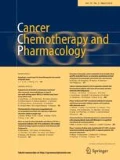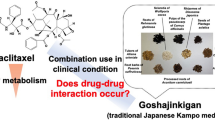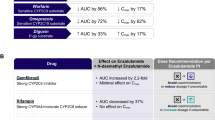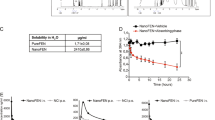Abstract
Purpose: All-trans-retinoic acid (ATRA) is a retinoid analogue that has been shown to be effective in acute promyelocytic leukemia. It is currently being investigated for efficacy in the treatment and prevention of various types of cancer. One of the factors limiting its use is the observed increase in ATRA clearance and elimination which occurs shortly after treatment is started, leading to reduced levels of drug in the body and loss of effectiveness. ATRA efficacy may be enhanced if this autoinduction of metabolism can be overcome, for example through the inhibition of the activity of the induced specific metabolizing enzyme(s). This requires the identification of this induced enzyme(s) and development of approaches to selectively inhibit its activity. Methods: In the course of a phase II evaluation of ATRA in prostate cancer, we investigated the activities of five specific cytochrome P450 (CYP) (CYPs 1A2, 2C19, 2D6, 2E1 and 3A4) and N-acetyltransferase enzymes using a newly developed five-drug cocktail involving caffeine, mephenytoin, debrisoquine, chlorzoxazone and dapsone respectively. Enzyme activities were assessed in 17 patients with hormone-refractory prostate cancer before the initiation of ATRA therapy, after 14 days of continuous ATRA administration and 7 days after cessation of drug therapy. Results: After 14 days of ATRA therapy, the activities of CYP2E1 (chlorzoxazone hydroxylase) and N-acetyltransferase (in fast acetylators only) were increased by 83% and 29% (P < 0.05), respectively. Both activities returned to baseline by 7 days after cessation of therapy and the profiles were similar to the changes seen in the clearance of ATRA itself. There were no changes in the activities of any of the other enzymes investigated. Conclusion: This study shows that ATRA selectively modulates the activities of specific metabolizing enzymes and that this approach may be useful in identifying enzymes that can be explored in an attempt to mitigate ATRA autoinduction through selective modulation of enzyme activities. Further investigations are required to determine whether the elevated enzymes are also responsible for the increased clearance and elimination of ATRA.
Similar content being viewed by others
Author information
Authors and Affiliations
Additional information
Received: 2 December 1996 / Accepted: 8 May 1997
Rights and permissions
About this article
Cite this article
Adedoyin, A., Stiff, D., Smith, D. et al. All-trans-retinoic acid modulation of drug-metabolizing enzyme activities: investigation with selective metabolic drug probes. Cancer Chemother Pharmacol 41, 133–139 (1997). https://doi.org/10.1007/s002800050719
Issue Date:
DOI: https://doi.org/10.1007/s002800050719




